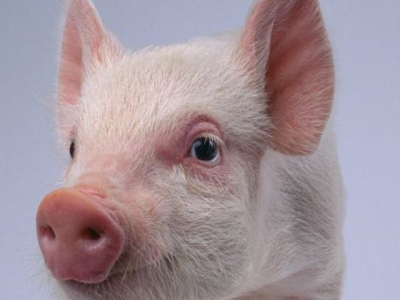Pigs help scientists understand human brain

Imaging analysis shows swine models even more effective for neurological research.
For the first time, researchers in the University of Georgia's Regenerative Bioscience Center (RBC) have used an imaging method normally used for humans to analyze brain activity in live agricultural swine models, and they have discovered that pig brains are even better platforms for the study of human neurological conditions such as Alzheimer’s and Parkinson’s than previously thought, the university said.
One immediate potential application is in the study and diagnosis of chronic traumatic encephalopathy (CTE), a progressive brain disease caused by a series of blunt trauma usually seen in professional football players and veterans, according to the announcement.
Currently, CTE can only be diagnosed through an autopsy; however, the new study strongly suggests that a translational swine model for mapping functional brain connectivity may be a promising approach to determine biomarkers or brain signatures that lead to CTE, the university said. Using such data, doctors would have the opportunity to diagnose CTE while a veteran or football player is still alive.
By using resting-state functional magnetic resonance imaging (rs-fMRI), the researchers demonstrated functional connectivity in sensorimotor regions of the swine brain that parallel those of the human brain. These regions include those where all perceptions, feelings, movements and memories are encoded. The similarities of these functional networks, as published in the journal Brain Connectivity, set the stage for targeted clinical applications in the treatment and prevention of neurological disorders, the announcement said.
Franklin West, associate professor of animal and dairy science in University of Georgia College of Agricultural & Environmental Sciences, and his RBC collaborator, Qun Zhao, drew comparisons between sensory and cognitive relevance found in swine and those previously established in people.
“Most of the models to-date deal with structural comparisons,” said Zhao, associate professor of physics in the Franklin College of Arts & Sciences. “Our model goes beyond brain mass and allows us to address questions related to brain connectivity and memory function. Without a functional map of the brain, it's hard to tell what parts of the brain are talking to each other.”
For years, researchers have posited that the shape and size of a swine brain bears physiological and anatomical similarities to the human brain and that, therefore, swine are considered a good animal model for neurological disease. However, according to the RBC team, scientists have not yet developed a unique model that captures functional connectivity or details the wiring diagram of the brain.
Neuroimaging typically helps researchers identify which regions of the brain activate when a person carries out a task. If there's any interruption in those connections, the functions needed to complete the task don't happen.
Those interrupted connections play a role in neurological disorders, such as Alzheimer’s disease, Parkinson’s disease, CTE and autism, the researchers said. With any of these disorders, the RBC collaborators can now model a 360-degree view of which parts of the brain are no longer talking to each other and which centers in the brain are being reactivated and reconnected.
“What this new model allows and has never been done before is for researchers to ask more refined questions about how the brain talks to itself, functions and coordinates action,” West said. “What we tend to say is the brain is a black box, and we don’t know how it works. This study is a game changer. It gives us a light to shine inside the box.”
The study, “Pig Brains Have Homologous Resting State Networks with Human Brains,” is available online here.
RBC at the University of Georgia links resources and researchers collaborating in a wide range of disciplines to develop new cures for devastating diseases that affect animals and people.
Related news
 Initial success achieved in ending surgical swine castration
Initial success achieved in ending surgical swine castration Project successfully deletes gene that triggers release of hormones necessary for sexual maturation.
 ASF vaccine research takes step forward
ASF vaccine research takes step forward Scientists at The Pirbright Institute in the U.K. have identified African swine fever virus (ASFV) proteins that can trigger an immune response in pigs
 ASF outbreak brings challenges, opportunities for US feed producers
ASF outbreak brings challenges, opportunities for US feed producers The outbreak of African Swine Fever in Asia may bring both challenges and opportunities to US feed producers as export demand dwindles initially and livestock